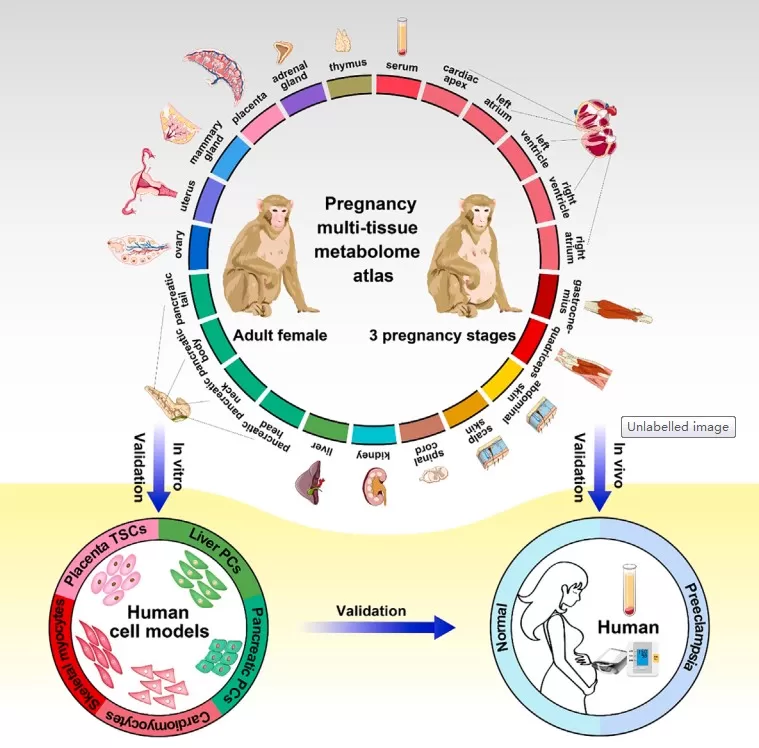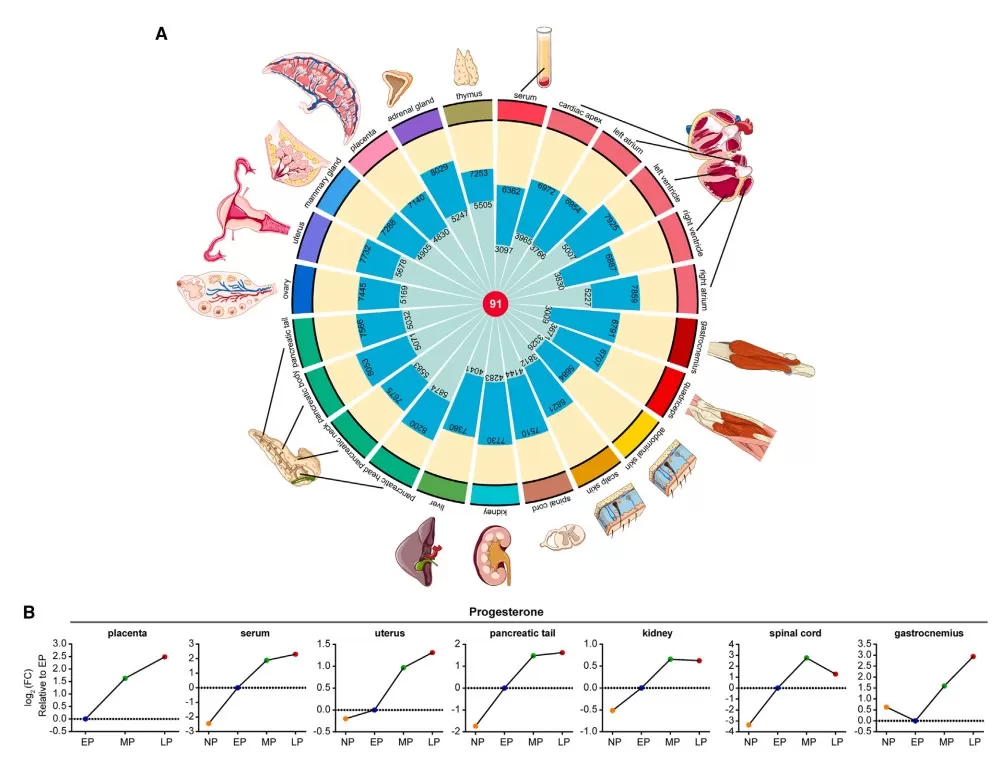The Miracle of Pregnancy: A Complete Metabolic Overhaul Across Maternal Organs
In a landmark study titled “A multi-tissue metabolome atlas of primate pregnancy” published in Cell, researchers leveraged untargeted metabolomics to map systemic metabolic adaptations across 23 maternal tissues in cynomolgus monkeys during pregnancy. Using liquid chromatography-mass spectrometry (LC-MS), the team analyzed 273 tissue samples from non-pregnant, early-, mid-, and late-pregnancy stages. The study identified dynamic metabolic coupling, rewired core pathways, and 91 pregnancy-adaptive metabolites, offering unprecedented insights into primate gestation and translational biomarkers for complications like preeclampsia (PE).
Pregnancy is a metabolically demanding process, requiring precise coordination across maternal organs to support fetal development. However, metabolic dysregulation during gestation often leads to life-threatening complications such as PE and gestational diabetes mellitus (GDM), which collectively affect ~20% of pregnancies globally. Traditional diagnostic tools, like ultrasound and blood tests, lack the sensitivity to detect early metabolic imbalances. This study addresses this gap by constructing the first multi-tissue metabolome atlas of primate pregnancy, combining cutting-edge LC-MS technology with cross-species validation to uncover mechanisms critical for maternal and fetal health.
Metabolic Coupling Declines as Pregnancy Progresses
Using LC-MS-based metabolomics and Spearman correlation networks, researchers discovered that metabolic interactions between 23 maternal tissues (e.g., placenta, heart, liver) weakened progressively from early to late pregnancy. For example, placental metabolism shifted from tight coupling with the uterus in early stages to stronger associations with ovarian and cardiac tissues later. This “metabolic decoupling” reflects tissue specialization to meet escalating gestational demands, a phenomenon previously uncharacterized in primates. Compared to single-tissue studies in rodents, this multi-tissue approach captures the systemic complexity of pregnancy adaptations.

A multi-tissue metabolome atlas of primate pregnancy
91 Pregnancy-Adaptive Metabolites Linked to Clinical Outcomes
The study identified 91 metabolites consistently altered across all tissues, with corticosterone and PC functionally validated in human cell models. Corticosterone deficiency in PE patients correlated with placental inflammation, while PC promoted progenitor differentiation in cardiac, pancreatic, and liver cells. Cross-validation with human serum data showed 85% concordance in upregulated metabolites, underscoring the translational potential of primate metabolomics. Unlike previous serum-centric studies, this multi-tissue atlas provides a holistic view of metabolic drivers in pregnancy complications.

Adaptive metabolites shared by multiple maternal tissues during pregnancy
Eight Core Metabolic Pathways Drive Gestational Adaptations
Pathway enrichment analysis (via MetaboAnalystR) highlighted eight conserved pathways rewired across most tissues, including steroidogenesis, fatty acid metabolism, and arachidonic acid metabolism. Steroid hormones like progesterone and corticosterone surged systemically, while intermediates such as palmitoyl-carnitine (PC) regulated tissue growth. These pathways align with known adaptations (e.g., insulin resistance, cardiac hypertrophy) but reveal novel cross-tissue coordination. For instance, corticosterone’s role in placental maturation challenges the traditional focus on cortisol, offering fresh therapeutic targets.
Discussion
This atlas redefines our understanding of metabolic regulation during pregnancy. By integrating multi-tissue metabolomics, the study reveals how global metabolic networks evolve to support gestation, offering biomarkers (e.g., corticosterone) for early PE detection. Compared to single-tissue or serum-focused studies, this approach captures the complexity of inter-organ crosstalk, though challenges remain in translating findings to human therapies. Future research could explore metabolite interactions or leverage multi-omics (e.g., proteomics, lipidomics) to deepen mechanistic insights.
At Metware Bio, we empower researchers with precision metabolomics solutions to unravel biological complexity. Our services are tailored for reproductive health, disease mechanisms, and biomarker discovery:
- Advanced LC-MS Platforms: High-resolution untargeted and targeted metabolomics for robust data generation.
- End-to-End Expertise: From experimental design to bioinformatics, we ensure seamless project execution.
- Cross-Species Validation: Proven success in translating animal model findings to human applications.
Reference:
Yu D., et al., A multi-tissue metabolome atlas of primate pregnancy. Cell. 2024 Feb 1;187(3):764-781.e14. doi: 10.1016/j.cell.2023.11.043.


